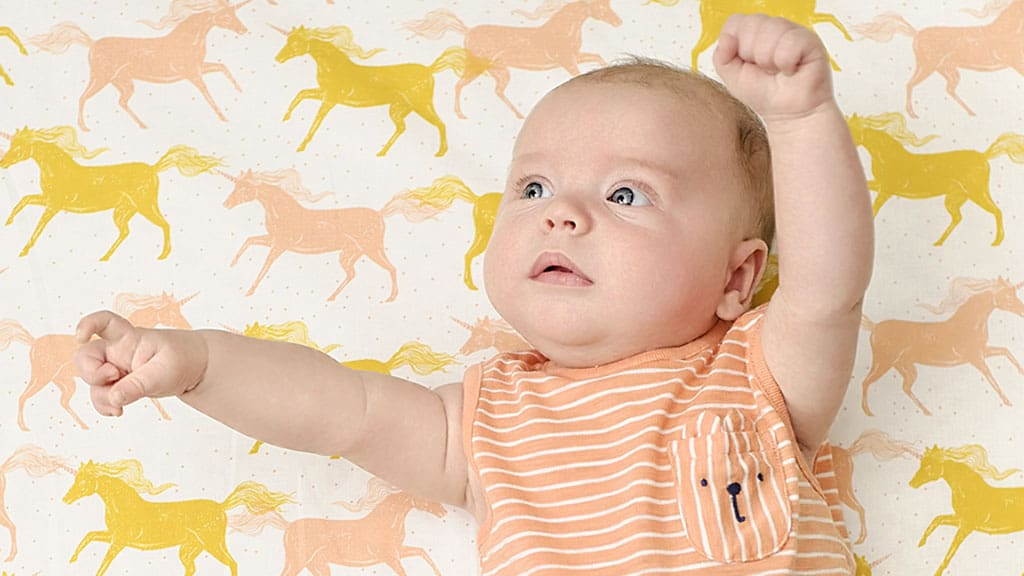
Table of Contents
While the 11-Week-Old baby starts to grab and clutch, your sleep cycle seems to gain some consistency. Let’s discuss your pelvic floor and how parenting podcasts could change your life for the good!
Your baby's first week after birth
Your 11-week old baby is gradually turning into a social butterfly. Now, your baby has a range of facial expressions, from a frown to wince to their adorable wide-mouthed smiles. They are trying to communicate with you. You might notice some gradual changes in your baby. Sometimes your little one will pause during feeding to give you a cute toothless grin, they want to play more, and will get fussy if they don’t get enough attention. It’s time to introduce your baby to a few fun games and activities. Here are some examples:
Home show:
- When you accompany the meaning of words with a gesture, babies will learn more readily.
- So, everyday spend at least 15 minutes pointing to objects as you name them. You can take your little one on a guided tour of your house, office, or even the grocery store.
- For instance, you can say things like ‘this is a doggie’, ‘this is a flower’, ‘that is a ball’, etc.
Mommy's tummy time:
- First, lie down on the floor on your back.
- Then, place your little one tummy-down on your chest.
- Now, they’ll have the perfect incentive to lift their head and look at you.
- Your baby might even use their arms to push their chest up a bit.
- Remember to not if it hasn’t happened yet. This developmental milestone can happen as late as 4 months of age. So, give your baby time because it’s normal.
Reach for the sky:
- For this simple yet fun exercise, dangle a bright toy or stuffed animal over your little one’s head.
- Then, encourage your baby to grab it.
- Make sure that your baby has to stretch to get it.
- This great infant workout will develop their hand-eye coordination.
- Also, your baby can relish your cheers of encouragement.
Your 11-week-old baby's development and physical growth
Let us look at what is happening with your baby and in their body in terms of their physical development in the tenth week after birth.
Your baby’s weight:
- Your little one is 11 weeks old now, they have grown quite a lot since birth.
- Your baby has gained more than half a kilo in weight by now since birth.
- Moreover, they’ll find it comfortable to sleep on a normal cot instead of their crib.
- You might’ve noticed your baby is getting strength in their limbs and fat in their cheeks. This makes them chubby and extremely adorable. Try not to pinch their cheeks too hard!
Your baby’s sleep:
- When your baby reaches 11 weeks, their sleep signs are evident and can be spotted easily.
- If your little one is tired, they’ll start yawning or don’t stare at anything for a long time.
- Their eyes turn red too.
- Once you start noticing these signs, it is important to get them to sleep as too much extension of tiredness will make them cranky.
- Your little one starts to develop a fixed time of sorts when they can sleep quite easily.
- If you miss these behavior signs of tiredness, your baby starts getting irritated.
- Thankfully, by now, your little one will know the difference between night and day.
- So, they tend to sleep more during the nighttime.
- As parents, you can get the sleep you require as well.
Your baby’s diet:
- At 11 weeks, your little one will be taking more at each feed and thus nurse less frequently.
- So, your breastfed baby will be far more efficient at nursing and even take their fill in just 5 to 10 minutes.
- At this age, your baby should have about 5 to 6 feeds over 24 hours on average.
- As long as your little one is at a healthy weight, you don’t need to worry about anything!
- Your bottle-fed babies, whether formula or expressed milk, will be taking bigger meals.
- Moreover, just to keep your baby’s stomachs full, some parents might think about introducing them to light solids.
- However, do not attempt to do so.
- Your little one’s stomach is still not strong enough to digest solids.
- Also, it could manifest in medical complications in cases of allergy.
- Additionally, always opt for formula, if you fail to supply your baby with enough milk. It is okay!
- If you’re using formula or expressing, a good guideline for feeding is 150 to 200 ml per kilo of their weight.
Your newborn and 11-week-old baby's reflexes
- Your little one now has increased strength in the upper body.
- They might be able to support themselves using their arms.
- Your baby might have started kicking and punching because they’ve more control over their muscles and have improved coordination
- You can use this as a good marker to understand when your baby can start crawling.
- They also try to grab onto the toys dangling above or on the bars of the crib.
- So, remember to not leave any harmful or unsanitary objects near your kid because they could end up in their mouth.
- This is a natural development for kids because they try to explore objects by feeling them and then chew on them.
- It develops their muscular strength which is required to chew on solid food.
- When held upright, your baby might be able to lift its head.
- Your little one will start responding confidently.
- You might notice more noises, smiles, and grunts from them.
- As a learning technique, listening to music or nursery rhymes will help their memory.
- At times, let your little ones be by themselves and engage in other activities.
Your newborn and 11-week-old baby's health
- Response and interaction: Usually, babies at this age are extremely physically active and communicative. So, consult your healthcare provider if your baby hasn’t shown any signs of interaction or response to sounds and moving objects.
- Vaccinations: If you’ve already properly administered all the important vaccines during the 8th week, there are no vaccinations that are required this week.
- Flat-head syndrome: Does your little one don’t like to spend time on their tummy? It’s very normal because mainly babies don’t. However, if they’re constantly on their back, it might result in a flat spot appearing on your baby’s head. This is referred to as Flat Head Syndrome. To manage it, simply reduce the amount of time your child spends on their back.
Postpartum baby tips: Week 11 after birth
Understanding your baby’s rumbling tummy
Sometimes your little one might end up having gas. This usually happens when they drink a lot of milk than required or they gulped down too much air along with breast milk or formula. You’ll notice that they’re squirmy, screaming, or just plain miserable. Here are some ways to make your baby less gassy and to ease their discomfort:
- Burp your baby twice. First, when you’re halfway through a feeding, then after they’re done.
- Keep them relatively upright.
- If you’re breastfeeding, cut down on gas-producing foods such as broccoli and cauliflower.
- If it’s getting severe, contact your pediatrician because it can be a digestive problem or an allergy.
- Additionally, to make it easier for your baby to pass gas, bicycle their legs, or throw them face down over your forearm, the pressure will make their tummy feel better.
Understanding overstimulation
When your little one is 11 weeks old, they love stimulation. It could be when you’re talking to them or they’re kicking or batting a toy or they’re splashing water in the bathtub. However, babies can feel overwhelmed because of too much of a good thing. To find out when your little one has had enough, try to look for the warning signs.
Understanding your baby’s cries
As your baby is growing, the volume and intensity of their cries are growing as well. They’ll try to cry in a different way to convey something else. Also, their demands start to become sharper and precise. Moreover, your baby’s personality is more evident now. As a parent, you’ll notice certain behavioral patterns such as stubbornness or calmness. Hence, making it easier for you to know what’s going on with them.
The mother's body after childbirth: What is happening in your body in the tenth week after giving birth?
Your postpartum baby weight
- It’s the tenth after your baby’s birth and you are looking for ways to return your body to its pre-baby state.
- However, there are lots of things you must love about your new body.
- Now, you have the larger breasts and butt (that you’ve always wanted) or a hormonal boost which resulted in great hair and nails.
- Moreover, if you still want to lose some weight, then head out for a long walk, yoga workout, or gyms (offers drop-off babysitting services), Zumba, or swimming.
- Remember that some things might never be the same again and that’s okay!
- Wear your new tummy or stretch marks on your hips as a badge of parenthood.
- Additionally, remember to be patient with yourself if you’re trying to work off the baby weight.
Your postnatal depression
- During your baby’s first year, postnatal depression can occur at any time.
- You might want to consult your healthcare provider and talk about the possibility of postnatal depression.
- You might sometimes feel an overwhelming sense of guilt or failure, or you might feel like everything could go wrong and everything is your fault.
- One in ten women deals with postnatal depression.
- Remember that you are not alone!
Final Thoughts
Yes, you’ve reached 11 weeks, which is simply one week shy from completing 3 full months. This is great news for your baby and you, too. Well done! These past few weeks might’ve been tough but you did it! Since your little one’s looks are starting to get prominent, people might’ve started telling you that they look like you or your spouse.
Remember to not be so hard on yourself. By now you must’ve started to get used to their existence and have become pro at parenting. But remember to take time out for yourself and each other! You’ve got this!
FAQs- Your 11-Week-Old Baby: Development, Growth, Health, Postpartum, New Baby Tips & Recommended Products
1. What should an 11-week old baby be doing?
2.How long should an 11-week old sleep?
3. What activities can I do with my 11-week old baby?
Reviewed By-

Nimrat, Pediatrics
Dr. Nimrat S Sidhu is a practicing pediatrician for about 5 years now and holds an MD pediatrics degree. She was the topper of her batch, has always had a keen interest in her core medical field, and is specially trained for neonatal resuscitation.





